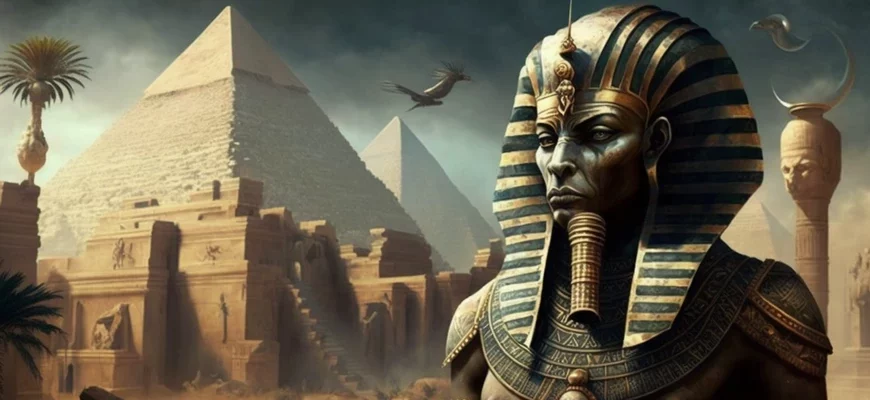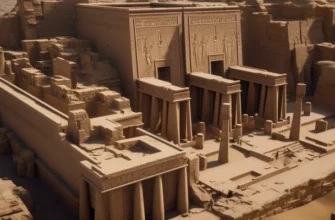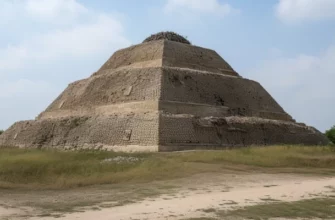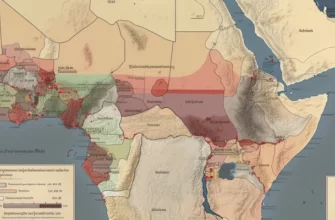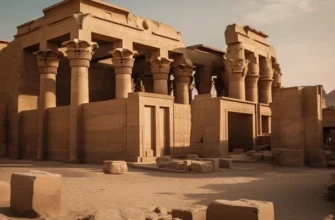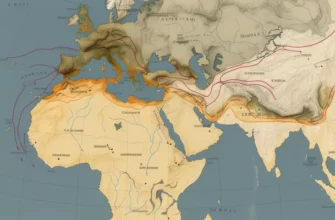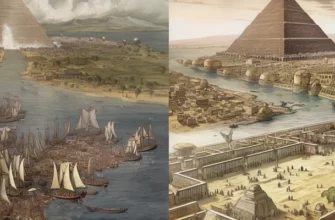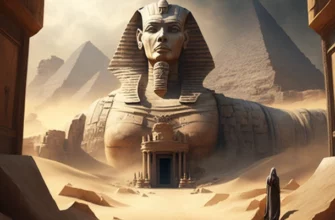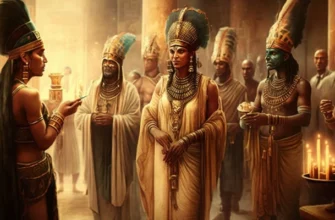The creation of Egypt was the result of many factors that combined and contributed to the formation of the great Egyptian civilization about 5,000 years ago. The article examines the cultural, religious, and social aspects that helped revive Egypt as a state. The author focuses on the development of writing and art, the invention and use of means of ripening bread, the cult of the sun god Ra and the belief in life after death, the development of agriculture and trade, the creation of a state system, and the maintenance of order. The article also explores the role of the pharaohs in the creation of Egypt and their contribution to the development of the country, as well as the impact of the creation of Egypt on world history and the role of Egyptian culture in the development of science, art, and religion.
- Cultural factors that contributed to the creation of Egypt
- The development of writing and art
- Religious factors that contributed to the creation of Egypt
- The cult of the sun god Ra
- Burial rites and beliefs in life after death
- Social factors that contributed to the creation of Egypt
- The creation of Egypt as a process
- The role of the pharaohs in the creation of Egypt
- Pharaohs as rulers and cultural leaders
- The impact of the creation of Egypt on world history
- Egypt as part of world civilizations
- The contribution of Egyptian culture to the development of science, art, and religion
Cultural factors that contributed to the creation of Egypt
Cultural factors played an important role in the creation of Egypt about 5,000 years ago. The development of writing and art became the basis for the development of Egyptian civilization. The invention and use of means of ripening grain ensured stability in food cultivation and contributed to population growth. Cultural achievements are reflected in the construction of pyramids, temples, gold jewelry, the development of calligraphy, and the unique art of Egyptian masters. Cultural factors were an essential element in the formation of the Egyptian state and paved the way for the rich and luxurious culture of Egypt.
The development of writing and art
The development of writing and art played a major role in the creation and development of Egyptian civilization. Egyptian writing is one of the oldest in the world and became a key element in the preservation of knowledge and the transmission of information from generation to generation. The development of art is evident in the construction of pyramids, temples, and the creation of a huge number of sculptures and paintings. Egyptian art was very symbolic and strongly linked to religious beliefs. The aesthetics of Egyptian art were unique and had a great influence on world art. In general, the development of writing and art were key factors in the formation of Egyptian culture and civilization.
Religious factors that contributed to the creation of Egypt
Religious ideas and beliefs played an important role in the creation and development of Egypt. Egyptian religion was polytheistic and included many deities associated with natural phenomena and agriculture. Many of these deities were symbols of agriculture and crop storage, which was a key sector of the Egyptian economy at that time. The religious hierarchy was very strong, but religious leaders were not completely isolated from politics. Their influence on society was very great, and they influenced all aspects of life in Egypt. Religious factors were an important element in the cultural life of Egypt and contributed to the formation of a unified nation and its stability.
The cult of the sun god Ra
The cult of the sun god Ra was one of the most important and widespread cults in Egypt. Ra was an important symbol of power and might, and his cult had a great influence on the social, political, and religious aspects of Egyptian society. There were many temples dedicated to Ra in Egypt, where various rituals and religious ceremonies were performed. Ra was often depicted as the god who ruled the sun, and his symbol was the sun with an inscription in the Egyptian language. The cult of Ra was very important to Egyptian civilization because it united the people under common religious beliefs and symbols.
Burial rites and beliefs in life after death
The Egyptians’ beliefs in life after death were very complex and carefully developed. They believed that after death, the soul goes through a series of stages, after which it passes into the afterlife, where it continues its existence.
Burial rites in Egypt were of great importance. They were designed to ensure that the body of the deceased could pass into the other world and that their soul could continue its journey. One of the most important elements of these rites was the embalming of the body, which was performed by highly skilled specialists who used various substances to preserve the body in the best possible condition.
After embalming, rituals were performed, including paying respects to the deceased, storing their organs in separate vessels, and other actions. Next, the body was placed in a sarcophagus and placed in a tomb, where additional religious rituals were performed so that the soul could continue its journey in the afterlife.
Social factors that contributed to the creation of Egypt
The creation of Egypt was the result of many social factors, including:
The development of agriculture: the presence of the Nile River, which provided sufficient moisture for agriculture, was a key factor in the development of civilization in Egypt. Agriculture became a source of food and materials for construction, and also provided opportunities for the development of other areas of the economy.
Religion: religious beliefs were of great importance in the formation of social structures in Egypt. Cultural traditions and religious rituals became a key element of Egyptian culture.
Territorial expansion: The conquest of neighboring lands and the formation of a unified state were made possible by the development of military technology and tactics.
Development of trade: Egypt was an important trading post at the crossroads between Asia and Africa. Trade contributed to the development of the economy and the enrichment of the country.
Climatic conditions: The climatic conditions in Egypt were favorable for the development of agriculture and the provision of water for life. This ensured the stable development of civilization over a long period of time.
Stability of government: The Egyptian pharaohs had a fairly stable administrative apparatus, which contributed to the development of the economy and culture.
Availability of resources: Egypt had rich resources such as stone, iron, and wood, which were used to build pyramids, temples, and other architectural structures, as well as to create various household items and religious artifacts.
Cultural influences: Egypt was an influential country in the region, attracting various cultures and trade relations. This contributed to the development of science, art, and literature.
Social structures: Egyptian society was organized in the form of a hierarchical pyramid, with the pharaoh at the top, who was the spiritual and secular leader of the country. This ensured the stability and organization of society.
Technological achievements: Egypt was one of the first civilizations to use writing and develop architectural technologies and mathematics. This contributed to the development of science and technology in the country.
All these factors together contributed to the creation of Egypt and its development over the millennia.
The creation of Egypt as a process
The creation of Egypt can be seen as a process that took place over a long period of time and was linked to changes in social, political, and cultural factors.
The first settlements on the territory of modern Egypt appeared about 5,000 years ago. At that time, people lived in clay houses and were engaged in agriculture. Over time, the first settlements and trading centers appeared, which contributed to the development of the economy and culture.
In 3100 BC, the first state system was created, uniting two large regions – Upper and Lower Egypt. Pharaoh Narmer became the first ruler of the united country. This period of Egyptian history is called the “Old Kingdom.”
Over the next centuries, Egypt developed and prospered. Pyramids, temples, and other architectural structures were built, and science, art, and literature flourished. Over time, the need arose for more complex state administration, which led to the development of bureaucracy and a hierarchical power structure.
In 2181 BC, Egypt was conquered by western tribes and fell under the rule of a foreign ruler. This period of Egyptian history is called the “Transitional Kingdom Period.” Later, in 1600 BC, Pharaoh Amos I ascended the throne of Egypt and began the process of reviving the state and its culture.
In the following centuries, Egypt experienced various periods of change and conflict, including periods of foreign rule and uprisings. However, thanks to its geographical and cultural heritage, Egypt retained its importance in the region and beyond.
In 332 BC, Egypt was conquered by Alexander the Great and became part of the Greco-Roman world. During this period, Greek and Roman culture developed in Egypt, as did Christianity and Islam.
In the 19th century, Egypt fell under the influence of European powers, which changed the political and economic landscape of the country. In 1922, Egypt became an independent monarchy with Fuad I on the throne. Over the following decades, the country experienced various periods of political crisis and conflict, which led to a change in the form of government.
In 1952, a revolution took place, after which a republican form of government was established in Egypt. The country underwent social and economic reforms, as well as conflicts with Israel and other countries. Over the following decades, Egypt experienced various periods of political instability and conflict, but the country retained its important role in the region.
Today, Egypt is a developed country with a rich cultural heritage and significant potential for economic development. The country is home to over 100 million people, and its economy is based on various industries, such as tourism, agriculture, the oil industry, and others. However, the country also faces various challenges, such as economic inequality, corruption, and political instability.
All of these factors have influenced the complex and lengthy process of Egypt’s formation. Much of the country’s history is linked to a multi-layered culture and civilization that has developed over thousands of years. Each period in Egypt’s history had its own characteristics, from the era of the pharaohs to the time of Islamic culture. These different periods reflect the diversity and complexity of the process of creating Egypt.
Thanks to its geographical and cultural heritage, Egypt has become one of the most important countries in the region, and its influence on the political, economic, and cultural development of many other countries has been invaluable. Today, the country continues to develop and has significant potential for further success and growth.
The role of the pharaohs in the creation of Egypt
The pharaohs played a key role in the creation of Egypt, which became one of the most influential civilizations in the world. They were recognized rulers who ruled the country for thousands of years, from the third millennium BC.
The pharaohs were not only political leaders, but also religious and cultural symbols. They were descendants of the god Ra and are known for their construction of pyramids, temples, and other structures that demonstrated the grandeur and power of Egyptian civilization. Many pharaohs also became famous for their wars and conquests, which allowed them to expand the country’s territory and influence.
The pharaohs were also known for their innovation and contributed to the development of science and technology. They developed new methods of stone processing, created a system of writing on papyrus, and studied astronomy and mathematics. These achievements helped Egyptian civilization maintain its strong position in the region for many centuries.
Thus, the pharaohs were key figures in the creation and development of Egypt, and their achievements and influence on the country’s culture, science, and politics remained significant for millennia after their deaths.
Pharaohs as rulers and cultural leaders
The pharaohs were not only political leaders but also cultural symbols who played an important role in shaping Egypt’s cultural identity. They were considered to be of divine origin, which gave them a special status in society. The pharaohs were recognized rulers who governed the country for thousands of years, from the third millennium BC.
As rulers, the pharaohs were absolute monarchs with unlimited power over the country and its people. They were responsible for economic development, ensured the security and defense of the country, controlled the justice system, and appointed high-ranking officials.
In addition, the pharaohs were cultural leaders who gave impetus to the development of art, architecture, literature, and religion. They carried out major construction projects, including pyramids and temples, which became symbols of Egyptian culture and technical expertise. The pharaohs also commissioned huge statues and painted the walls of temples and other buildings, which helped to preserve information about Egyptian history and culture.
The pharaohs also influenced the development of religion, which played an important role in Egyptian life. They were considered descendants of the god Ra and were the object of divine worship. The pharaohs financed the construction of temples and storehouses for the gods, appointed priests, and sponsored religious festivals and rituals.
Thus, the pharaohs were not only political and military leaders, but also cultural and religious figures who played a key role in the creation and preservation of Egyptian civilization.
The pharaohs also influenced the formation of the social hierarchy and the distribution of power in the country. They appointed high-ranking officials to help them rule the country and controlled the taxation system and land distribution. The pharaohs established laws and rules that regulated the behavior of people in Egyptian society.
Along with this, the pharaohs were important symbols of unity and stability in the country. Their reign was accompanied by various religious and cultural events that contributed to the strengthening of national identity and the unification of people around common goals.
All this allowed the pharaohs to become not only the rulers of the country, but also symbols of Egyptian civilization, which continues to leave its mark on world history and culture to this day.
Their achievements and contribution to the development of Egypt
The pharaohs made a significant contribution to the development of Egypt through their achievements in various fields.
One of the most famous pharaohs, Cheops, built the Great Pyramid of Giza, one of the Seven Wonders of the World. This contributed to the development of architecture and construction in Egypt. Pharaoh Senusret III developed the mining industry, and Ramses II built the Great Temple at Abu Simbel and created one of the greatest memorials in the world, the famous Temple of Ramses II in Luxor.
The pharaohs also contributed to the development of religion and culture in Egypt. They encouraged the construction of temples and palaces, organized religious ceremonies and festivals, and supported the arts, poetry, and literature. For example, Pharaoh Amenhotep III founded a cultural center where literature and art flourished.
The pharaohs also played an important role in the development of science and technology. They produced glass instruments, conducted medical research, and developed mathematics and astronomy, which allowed them to find new ways to solve problems and improve the lives of people in the country.
Thus, the pharaohs contributed to the development of Egypt and became important figures in the history of this great civilization.
The impact of the creation of Egypt on world history
The creation of Egypt as a state has had a significant impact on world history. It is known that Egyptian civilization existed for more than 3,000 years, so it left a big mark on many aspects of human life.
One of Egypt’s most important contributions to world history is its influence on the development of science, technology, and art. Egyptian scientists and inventors created a large number of inventions that were used in various fields, including architecture, engineering, mathematics, astronomy, and medicine.
Egypt was also one of the first civilizations to develop writing. Their system became the basis for the further development of writing in many other countries.
Egyptian culture had a great influence on world art. Their images of pharaohs, gods, and heroes became known throughout the world, and their structures, such as pyramids and temples, are amazing examples of architecture.
Egypt also played an important role in world trade due to its location at the crossroads of trade routes between Asia, Africa, and Europe. Its wealth and resources, such as gold, sometimes led to wars and conflicts with neighboring states.
Overall, Egypt’s influence on world history lies in the fact that it created one of the most remarkable and enduring civilizations, which shaped the cultural and historical face of the modern world. The discoveries and inventions made by Egypt have greatly enriched and expanded human knowledge.
In addition, Egypt has played an important role in world history due to its geopolitical position. In ancient times, it was one of the largest and most powerful states in Africa and the Middle East, which gave it considerable influence over the region and the world as a whole.
An important factor in Egypt’s role in world history was its religious culture. The religious beliefs and practices of the Egyptians formed the basis of mythology and religion, which were reflected in the culture of many peoples and civilizations.
In general, the creation of Egypt played an important role in the development of the world as a place for the development of science, technology, and art, a cultural and religious center, and a geopolitical leader. It became a source of great innovation and knowledge that influenced the modern world and its cultural and historical heritage.
Egypt as part of world civilizations
Egypt is considered one of the oldest civilizations in the world, which has made a significant contribution to the formation and development of world culture and civilization.
One of the main characteristics of Egypt was its architecture. Many buildings, including pyramids and temples, built by Egyptian pharaohs, became the most remarkable monuments of the ancient world and determined the style of construction for many centuries to come.
Egyptian art, including reliefs and frescoes, also made a significant contribution to world culture. Its execution was sophisticated and highly technical, allowing images and information to be preserved for centuries.
In terms of science, Egypt made a significant contribution to the development of mathematics, astronomy, and medicine. It developed its own system of weights and measures, studied the stars and planets, and used various plant and animal remedies in medicine.
In the field of religion, Egypt had its own pantheon of gods and goddesses who reflected various aspects of nature and human life. Egyptian religion influenced the formation of other religions, including Greek and Roman.
Thus, it can be said that Egyptian civilization made a significant contribution to the development of world culture and civilization in many areas, including architecture, art, science, and religion.
The contribution of Egyptian culture to the development of science, art, and religion
Egyptian culture has made a significant contribution to the development of science, art, and religion.
In terms of science, the Egyptians were known for their achievements in mathematics and astronomy. They developed a system of calculation that used the decimal system and used geometry to measure land plots. Egyptian astronomers studied the movements of planets and stars and created a calendar consisting of 365 days. Their achievements in these fields influenced the development of science for many centuries.
In art, the Egyptians created unique works of art, including sculptures, reliefs, and frescoes. They used a technique of firing ceramics that allowed them to create complex and detailed decorative items. Their works of art have great cultural significance, and to this day, Egyptian art remains unique.
In religion, Egyptian culture influenced the formation of other religions, particularly Greek and Roman. Their gods and goddesses were associated with various aspects of life and nature, and they had their own priests and temples. Egyptian religion believed in life after death and played an important role in the artistic creation of pyramids and other burial structures.
Thus, the contribution of Egyptian culture to the development of science, art, and religion is significant and has great importance for world history. Egypt was one of the first civilizations to develop in the Nile Valley, and its achievements were the first step on the path to modern science and art.
In addition, Egyptian culture influenced other countries, particularly Greek and Roman cultures. Elements of Egyptian artistic and religious traditions can be found in the architecture, sculpture, and literature of these countries. For example, Greek and Roman gods and goddesses were associated with Egyptian deities, and the Greek historian Herodotus considered Egypt “the gift of the Nile” and visited it to study its culture and customs.
Egyptian culture also influenced the development of Christianity and Islam, which were the main religions that emerged in Egypt. Most Egyptian Christians belong to the Coptic Orthodox Church, which has its own traditions and rituals. Islam, which became the dominant religion in Egypt in the 7th century, also reflected the cultural influence of Egyptian tradition, including architecture and literature.
Thus, the contribution of Egyptian culture to the development of the world is enormous and diverse, and it continues to influence our modern world.
